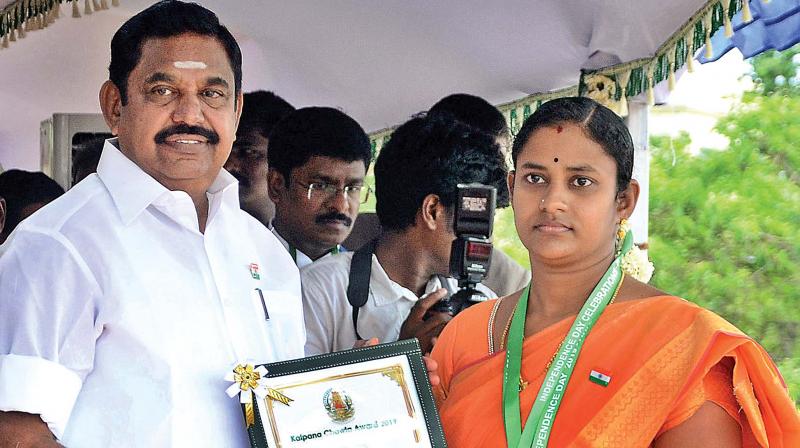Vellore trifurcated: Tamil Nadu has 37 districts
The decision to divide Vellore district was made following consideration of representations from ministers, MLAs and the public.

Chennai: Chief Minister Edappadi K. Palaniswami on Thursday announced the creation of two more new districts in Tamil Nadu by trifurcating the Vellore district into Vellore, Tirupathur and Ranipet. Also a new taluk will be formed with headquarters at K V Kuppam in Vellore district, he said in his Independence Day address after unfurling the national tricolour at Fort St George here on Thursday. The decision to divide Vellore district was made following consideration of representations from ministers, MLAs and the public.
Two new districts with Ranipet and Tirupattur as headquarters will be carved out from Vellore and K V Kuppam in Vellore district will be upgraded into a new taluk, he said. Vellore will continue to function as a separate district. On July 18, Palaniswami had announced the creation of new districts: Tenkasi and Chengalpattu by carving out from Tirunelveli and Kanchi districts, respectively, and along with the two districts carved out of Vellore, TN will have a total of 37 districts.
Vellore is one of the largest districts in the state in terms of area having 13 Assembly constituencies and the district is divided between three Lok Sabha constituencies of Vellore, Arakkonam and Tiruvannamalai. The distance between the two ends of Vellore district is around 150 km.
The announcement would mean that in the coming days, people from Tirupathur and Ranipet will be spared of travelling long distances to reach the collector's office in Vellore. Presently, people living in Tirupathur have to travel 92 km to reach the collectorate in Vellore and those living in Ranipet need to travel 26 km to reach Vellore.
In January, Kallakurichi was announced as Tamil Nadu's 33rd district, created from erstwhile Villupuram district. Ensuring drinking water, protecting water bodies, key challenge:
Turning to other issues, Palaniswami said the key challenge Tamil Nadu today faces is ensuring drinking water availability by rainwater harvesting and safeguarding water bodies. Recalling the government's initiatives in this regard since the times of late Chief Minister J. Jayalalithaa, he said desilting work in reservoirs including Poondi that meet Chennai's drinking water needs were on.
While the work for over Rs 1,259 crore Nemmeli desalination plant here is on, preliminary work for a similar project at an estimated cost of Rs. 6,078 crore is also under progress. "We have urged the Centre to expeditiously implement a plan to link Godavari and Cauvery rivers which will be a good solution to water needs for drinking and farm purposes in several districts of Tamil Nadu," the Chief Minister said.
He also assured appropriate action to prevent pollution of Bhavani, Vaigai, Amaravathi and Tamirabarani Rivers and steps to implement "Nadanthai Vazhi Cauvery," programme to clean up and rejuvenate Cauvery river on the lines of Centre's Namami Gange.
Urging the people to extend their support to the Tamil Nadu Water Resources Conservation and Augmentation Mission, he hoped the initiative will lead to emergence of the state as a region of water resources. Taking into account that Palmyra trees act as a guardian of ground water resources, the government would encourage its cultivation, and 2.5 crore seeds will be distributed to farmers at a cost of Rs 10 crore, he said.
Cauvery board will continue to function:
Asserting that the setting up of Cauvery Management Authority and the Cauvery Water Regulation Committee were among his government's achievements, Palaniswami pointed out that even if the Centre's proposal of setting up a tribunal for hearing inter-State river disputes materialises, the "two bodies would continue to function."
Palaniswami said a Chief Minister's special grievance redressal scheme would be held in August and September. The State government would soon formulate a policy for recycling water and it would facilitate providing recycled water for re-use in industries.
The Chief Minister also recalled the sacrifices made by various freedom fighters and leaders during the Indian freedom struggle and said Tamil Nadu played a great role in the independence movement. He listed out several freedom fighters including Veeran Poolithevan, Dheeran Chinnamalai, VO Chidambaranar, Rajaji and Kamaraj. To commemorate their sacrifices and honour them, the government has built 35 memorials, erected their statues and held events. Palaniswami announced a hike in the pension of freedom fighters to Rs. 16,000 from Rs. 15,000 and the family and special pension to their heirs to Rs. 8,000 from Rs. 7,500.
This is the third time Palaniswami is hoisting the national flag as Chief Minister. Governor Banwarilal Purohit unfurled the tricolour at the Raj Bhavan here.
Deputy CM O. Panneerselvam, Assembly Speaker P. Dhanapal, Council of Ministers, senior State government officials, officers from the armed forces and state police, were also present during the parade.

